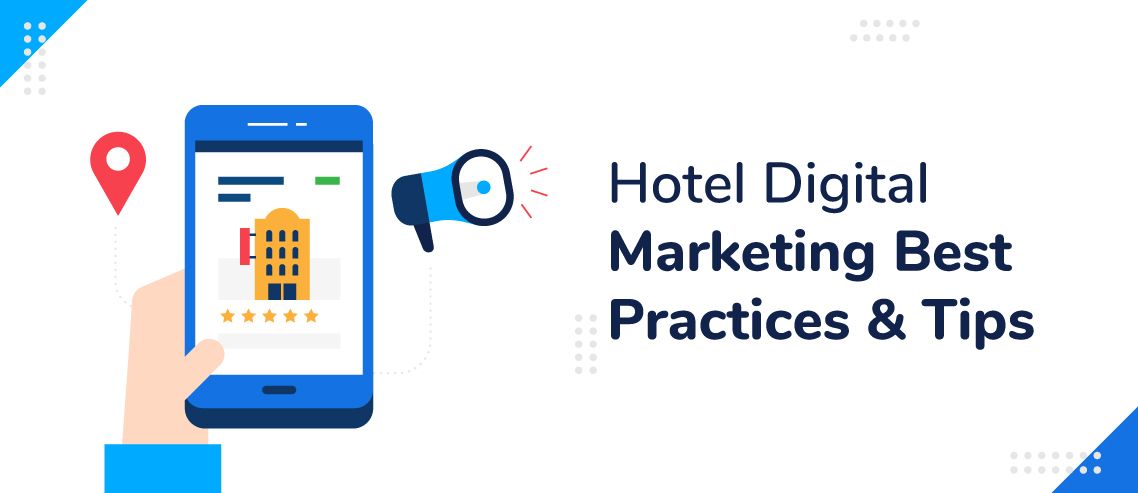Hotel Digital Marketing Best Practices & Tips

We all know that social media and SEO are key to successful marketing campaigns, but how can you utilize these diverse channels and techniques to increase conversions?
That’s what we’ll cover in this guide. Here, we’ll provide a few essential tips that can help your hotel position itself strongly online. We’ll cover specific strategies including utilizing UGC, Google My Business, video, and website optimization.
Let’s get to it.
1. Encourage UGC (user-generated content)
User-generated content, aka UGC, is exactly what it sounds like: content that is generated by users.
But what exactly does that mean when it comes to marketing? Well, imagine that a couple comes to stay at your hotel, posts a selfie standing right in front of the main billboard on their Instagram, and tags you. That’s an example of UGC.
Essentially, UGC is a form of social proof. It’s an effective marketing tool because when potential customers see real people willingly creating content to promote a business, they figure it must be good – if these people like it, why wouldn’t they?
The tough part, however, is figuring out how to encourage your guests to actually make some UGC for your business.
To do this, you can use a few different strategies that range from simple and straightforward to unique and creative.
On the simple side of things, you can simply ask your guests to tag your hotel in their vacation photos, which will likely include something inside or near the hotel. You could include this request in your room key holder, on a sign, or anywhere else you can think of.
If you’re willing to get a bit more creative, you can try to make your hotel into something of a landmark that your guests simply won’t be able to resist posting about. For example, you could commission a sculpture in front, use an interesting design language in the interior, or even a photo stand-in that has your branding on it.

2. Register Your Hotel With Google My Business
Ever Googled a store or restaurant and seen its info pop up on the right-hand side of Google along with its phone number, reviews, and other essential information? If so, you already know what Google My Business is.
As you probably know from your own usage of this feature, having your hotel show up in this way on the Google SERPs makes it much more likely that prospective guests will check out your hotel and book a stay.
So, how do you get your business to show up on the Google sidebar? To start, all you have to do is sign up for Google My Business. After that, you’ll need to verify your business.
To do this, Google will either mail you a postcard with a verification code, call your business phone number, send you an email, allow you to do instant verification if you’ve already verified your business with Google Search Console, or do bulk verification if you have multiple locations. Not all these options are available for all businesses.
Then, simply fill out your profile with as much information as possible, making sure to follow standard copywriting and advertising guidelines.
3. Utilize the Power of Video
Video is a powerful medium because it grabs a viewer’s attention more quickly than still images.
When you’re scrolling down your Instagram feed, a video is more likely to catch your attention simply because it’s moving, and humans have evolved to pay attention to things that move in case they’re dangerous – like a tiger sneaking up behind you.
Plus, besides simply sticking out more on an otherwise static newsfeed, videos can pack a lot of information into a concise and entertaining package. In a visual-centric space like the travel and tourism industry, being able to show prospective guests well-edited videos of your hotel can make it stand out from the competition.
Keep in mind that when people travel, they want to create memories. If you create a cinematic video that is enjoyable to look at, you’ll give your prospective guests a taste of what they can expect if they decide to book a stay. It’s a great way of showing your guests what type of memories they may be able to create at your hotel.

4. Optimize Your Website
Few things can sink a potential booking like a poorly optimized website.
If you haven’t already ensured that your website is running flawlessly from a technical perspective, then that should be your first order of business. Websites that load slowly can frustrate guests and make them navigate away before they even get to see what you have to offer (page load speeds also affect SEO).
Similarly, if there are any bugs in your booking process, you can easily lose a sale.
The first step in fixing these issues is simply identifying them. Test out your site by visiting it and booking a stay on several different browsers, devices, and computers.
If everything checks out (no pun intended), then you can move onto on-page SEO. This is when you should go through your website and ensure that you’ve used your targeted keywords several times throughout your site, that you’ve properly used meta tags and meta-descriptions, etc.
You may also want to consider developing a blog to target additional keywords if you don’t have one already. Utilizing the Google Trends API can also provide valuable insights into popular search terms and topics related to your industry. This helps you refine your keyword strategy and stay ahead of the competition. Make sure to track user data to further optimize your site. But you’ll have to know what to do with a person’s data once you have it. For example, if you’re noticing that it takes 30 minutes for someone to book a stay, you can cut the time down by reducing the number of steps it takes to reach the final booking screen
Hotel digital marketing is all about showing your prospective guests that you can create a seamless, comfortable, and memorable experience for them if they stay at your hotel.
By utilizing social proof, making your business easy to find, catching your viewer’s attention with video, and making your website easy to use, you’ll be on your way to improving your hotel’s digital presence.
JD enjoys teaching people how to use ZoomShift to save time spent on scheduling. He’s curious, likes learning new things everyday and playing the guitar (although it’s a work in progress).



